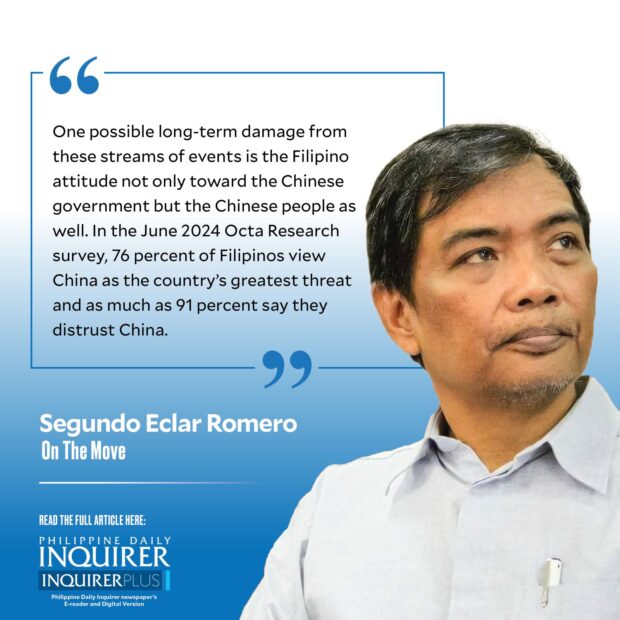Controlled friction without fire

It is a sad prospect but the Chinese aggression in the West Philippine Sea (WPS) will ratchet up in the next few months and years. The injury of a Filipino soldier, the loss of rifles and equipment, and the destruction of property will escalate into deaths and more damage until some resolution is reached.
Neither China nor the Philippines wants war in the South China Sea, so the management of the friction to a level that does not require the Philippines to invoke the Mutual Defense Treaty (MDT) with the United States is one possible scenario. This scenario of “controlled friction without fire” will play out like the Chinese PLA “rumble” with the Indian Army in Galwan Valley along the China-India border in the Himalayas in June 2020 that was fought with sticks and clubs, but led to the death of 20 Indian and four Chinese soldiers.
This tenuous but controlled conflict is possible through a 1996 agreement between China and India that prohibits the use of guns and explosives near the border. A similar agreement needs to be written into an agreement in the case of conflict in the WPS. Other provisions, such as preventing the boarding of vessels, use of military-grade lasers, and willful collisions and damage of property should be negotiated.
The threshold publicly announced by President Marcos of what constitutes an act short of war—the death of one Filipino soldier or Filipino citizen by a willful act by the Chinese forces may now look too low and precipitate. There is no reason casualties in skirmishes with the Chinese military and coast guard should be less than the skirmishes with the New People’s Army or Islamist terrorists. More anticipatory operational terms should be negotiated with the Americans as part of the consultative mechanisms under the MDT.
Meantime, the Philippines’ “assertive transparency” tactic is causing reputational damage to China, exacerbating its domestic economic troubles and the restiveness of its population as foreign investment drains from the country. Chinese families trying to enter the US through the southern backdoor are voting with their feet against the CCP. China is increasingly pictured as a rogue state in international media. Pushback is increasing among the Western countries as seen in the recent G7 Summit, but understandably more muted among other Indo-Pacific nations that depend too much on Chinese trade and investments.
Public opinion as a driver of foreign policy needs to be managed. The CCP has brainwashed and mobilized the Chinese people to assert the nine-dash line narrative. This has propelled the aggressive actions of the China Coast Guard that spring not only from CCP policy but also from Chinese military and militia personal attitudes toward Filipinos who they genuinely believe are interlopers in their territory.
On the other hand, the attitude of the US government is not entirely a matter of treaties like the MDT with the Philippines. The letter of the policy is embedded in language with strategic ambiguity. In the end, military conflicts the US engages in require the demonstrable support of American public opinion. As the US enters a presidential election period, only a dramatic critical event would turn American public opinion toward another conflict in yet another theater—the South China Sea.
In the Philippines, there are fears that Sinophobia is rearing its head, and no less than Filipino-Chinese civic leader Teresita Ang See has voiced alarm over the continuing “political carnival” over the curious case of Bamban Mayor Alice Guo and the intense campaign to ferret out and eject the Pogos.
One possible long-term damage from these streams of events is the Filipino attitude not only toward the Chinese government but the Chinese people as well. In the June 2024 Octa Research survey, 76 percent of Filipinos view China as the country’s greatest threat and as much as 91 percent say they distrust China. The assertive transparency is agitating the Filipino people, and they are beginning to demand more retaliatory action, failing which the Marcos administration will be perceived as weak or incompetent.
It is time to anticipate and manage anti-Chinese sentiments. This is an aspect of policy that needs to be managed as well, because, in cultivating and projecting an image of restraint and law-abiding behavior, the level of civility and protection of the human rights of Chinese nationals in the Philippines must be guaranteed.
——————
doyromero@gmail.com




















